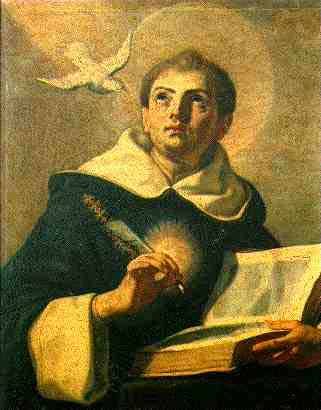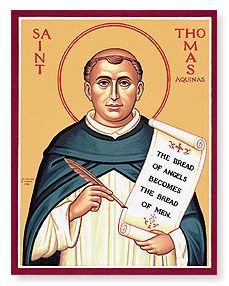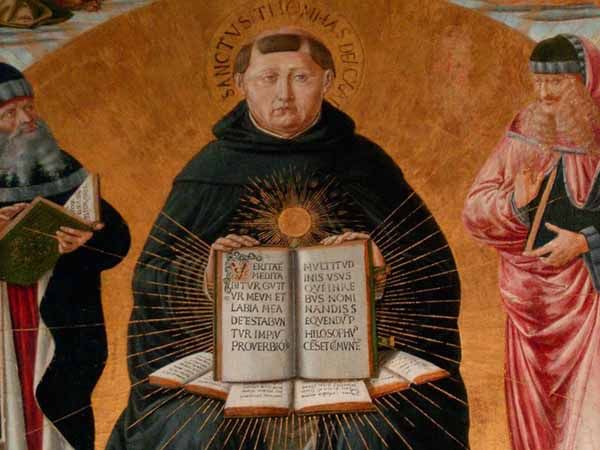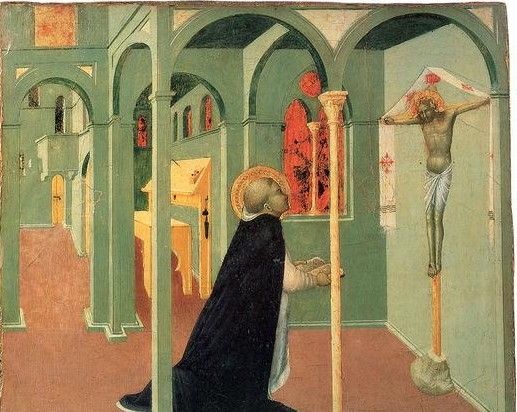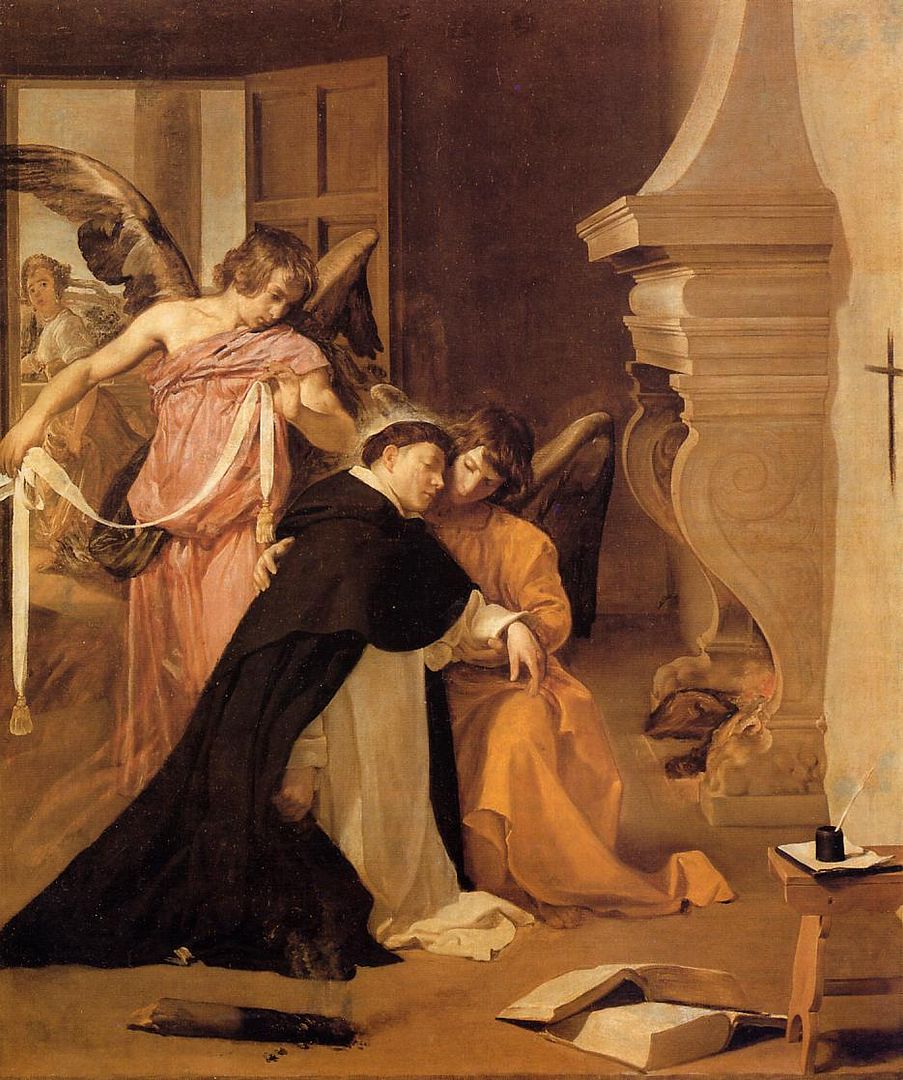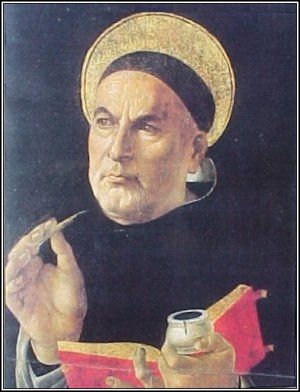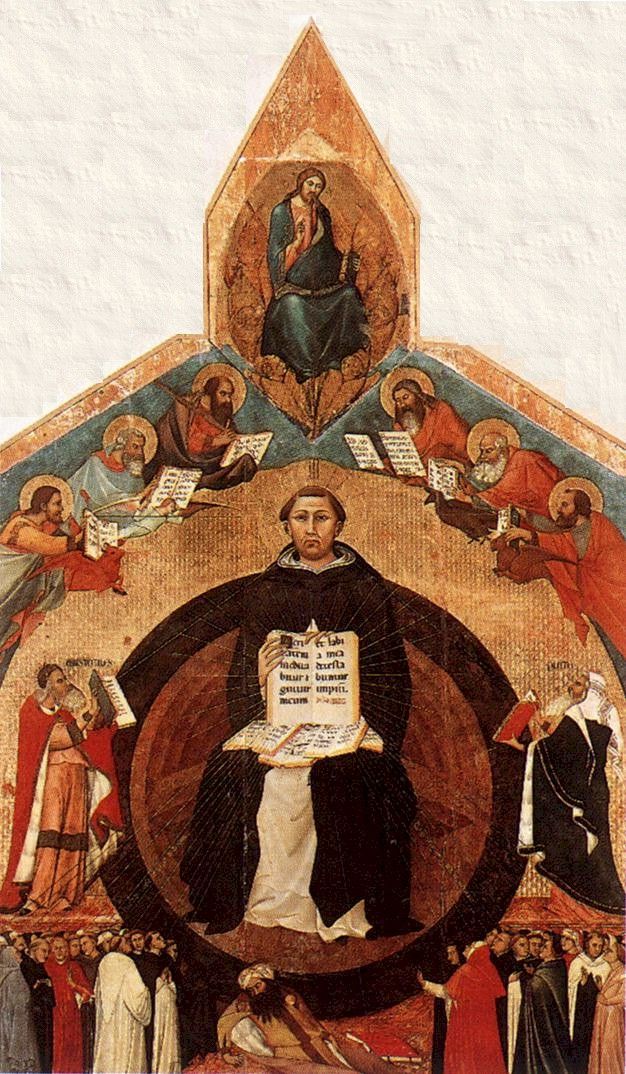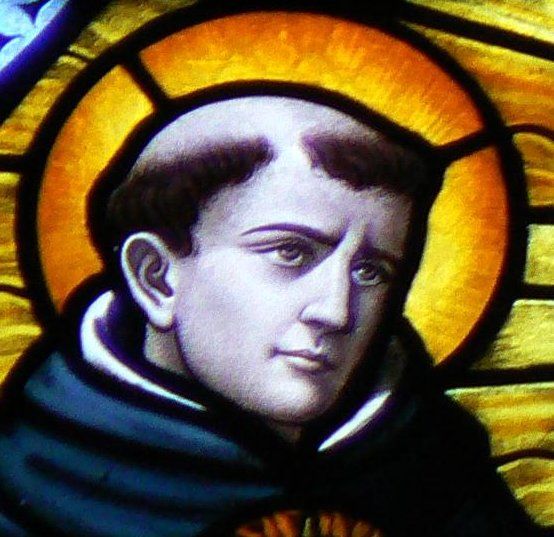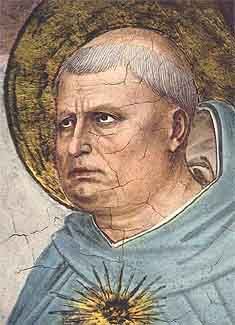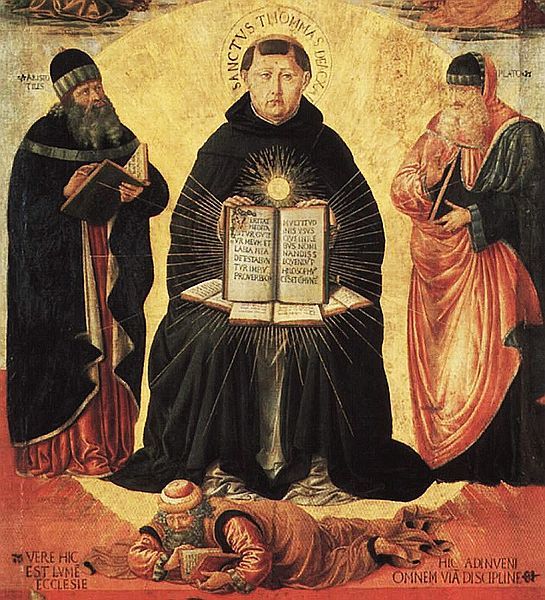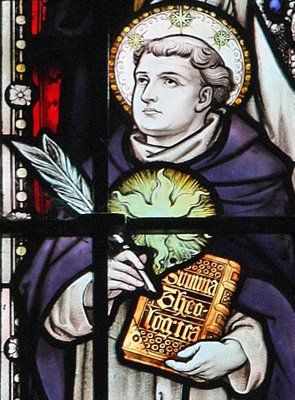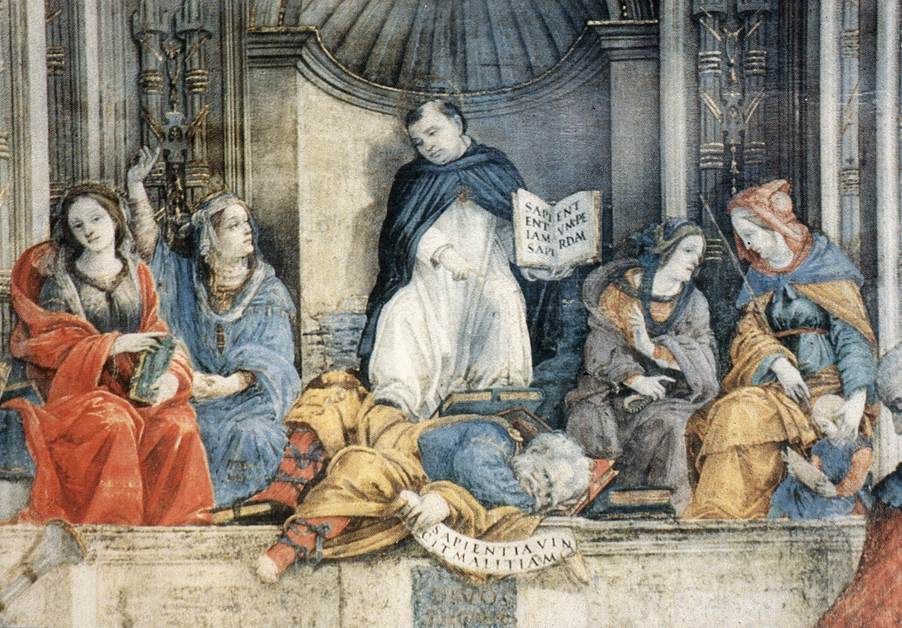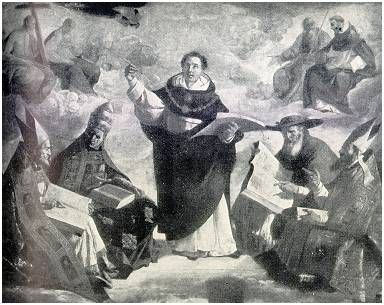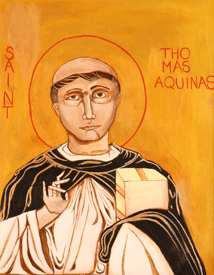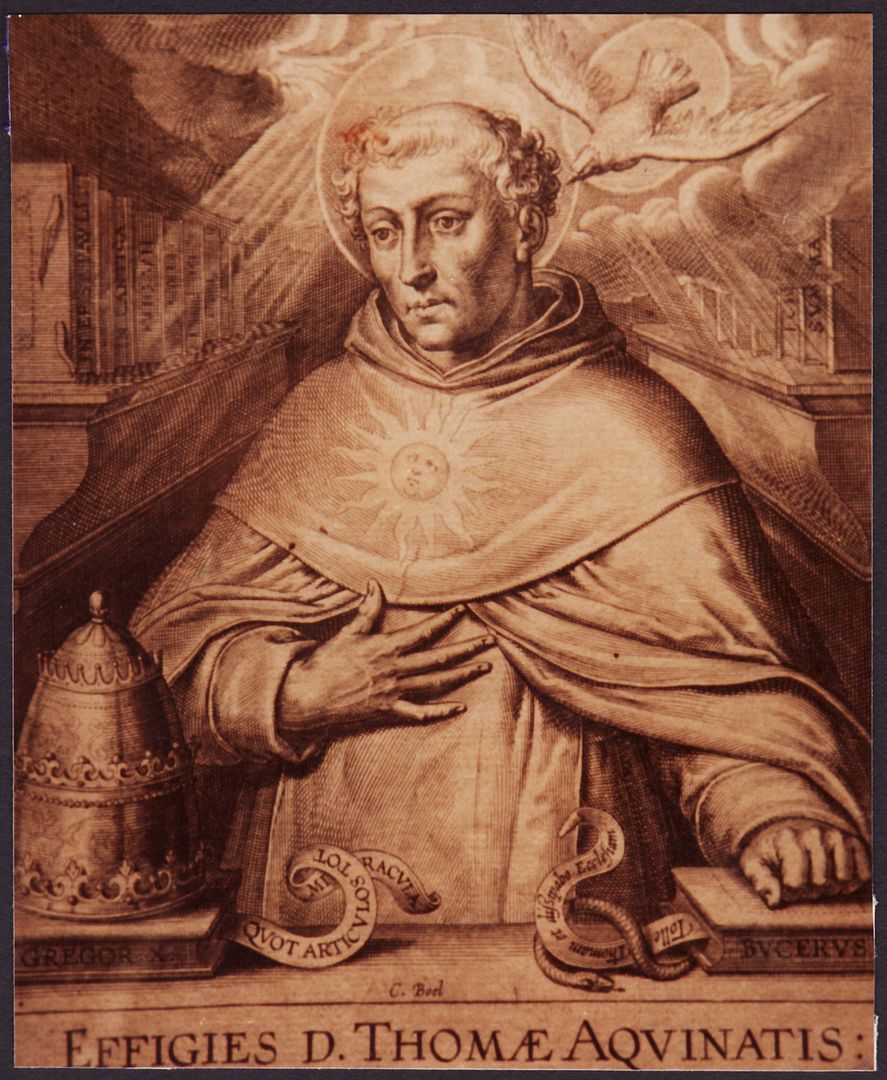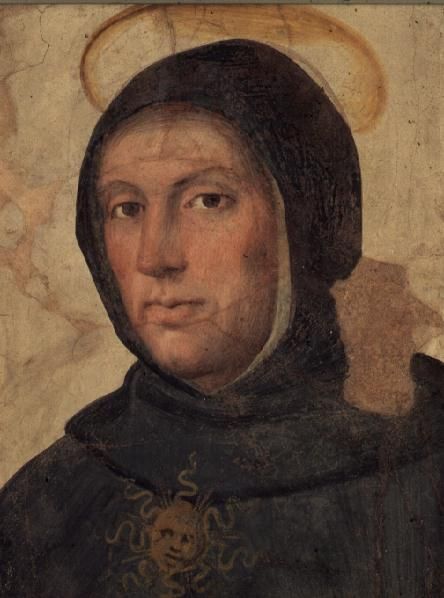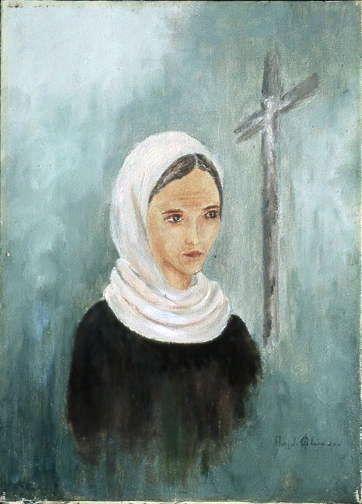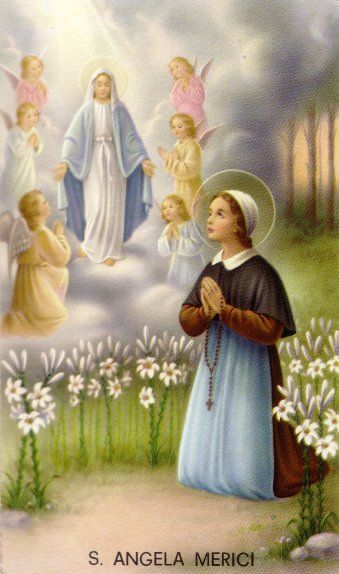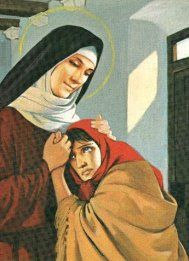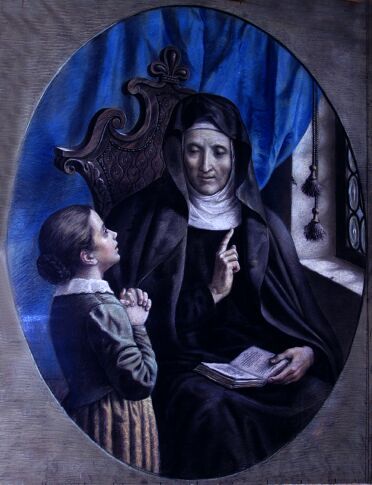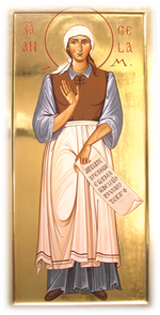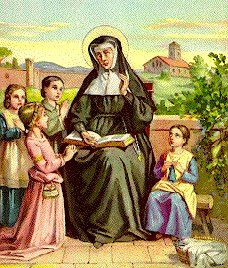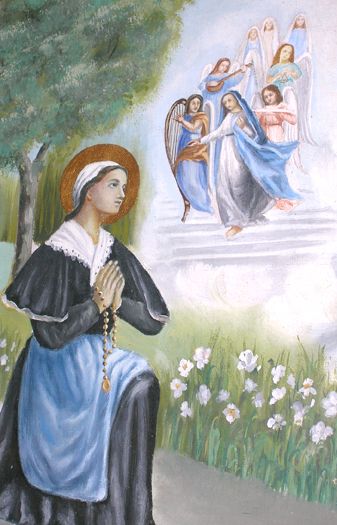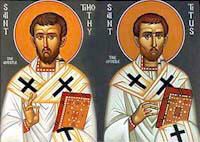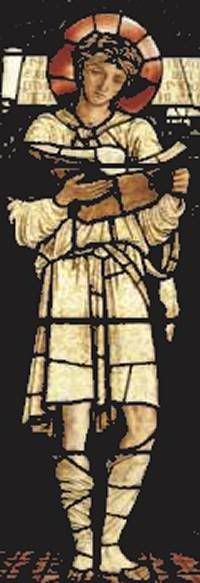Today, January 28, we celebrate the feast of Saint Thomas Aquinas (1225-1274), Doctor of the Church, patron saint of universities and students, and the greatest teacher of the medieval Catholic Church. Alternately referred to as the Angelic Doctor and the Universal Doctor, the teachings of Saint Thomas Aquinas greatly influenced not only Church doctrine, but schools of theological and philosophical thought. Candidates for the priesthood are instructed to model themselves after this holy man, and Pope Benedict XV declared that his teachings were the teachings of the Church, herself. By universal consent, this holy man is the preeminent spokesman of the Catholic tradition of reason and divine revelation.
Below, an excerpt from a commentary written by Saint Thomas on John 14:6: Jesus as the Way, the Truth, and the Life.
Christ himself is the way, and therefore he says: I am the way. This certainly is eminently right for through him we have access to the Father.
Since this way is not separate from its end, but joined to it, he adds the truth and the life; thus he is himself at once both the way and the goal. In his human nature he is the way, and in his divine nature he is the goal. Therefore, speaking as man he says: I am the way; and speaking as God he adds: the truth and the life. These two words are an apt description of this goal.
For this goal is the object of human desire, and a man desires two things above all. In the first place he wants to know the truth, which is peculiar to him; and secondly he wants to continue to exist, which is common to all things. Christ is the way by which we come to know truth, though he is also that truth: Lead me, O Lord, in truth, and I shall enter into your way. Christ is also the way to come to life, though he is also that life: You have made known the ways of life.
Therefore, he designated the end of this way by truth and life, about which we have spoken above with reference to Christ. First, he himself is life, for life was in him; then, he is truth, because he was the light of men, and light is truth.
If, then, you are looking for the way by which you should go, take Christ, because he himself is the way: This is the way; walk in it. And Augustine says: Make man your way and you shall arrive at God. It is better to limp along the way than stride along off the way. For a man who limps along the way, even if he only makes slow progress, comes to the end of the way; but one who is off the way, the more quickly he runs, the further away is he from his goal.
If you are looking for a goal, hold fast to Christ, because he himself is the truth, where we desire to be. My mouth shall reflect on the truth. If you are looking for a resting place, hold fast to Christ, because he himself is the life. Whoever finds me finds life, and receives salvation from the Lord.
Therefore hold fast to Christ if you wish to be safe. You will not be able to go astray, because he is the way. He who remains with him does not wander in trackless places; he is on the right way. Moreover he cannot be deceived, because he is the truth, and he teaches every truth. And he says: For this I was born and for this I have come, to bear witness to the truth. Nor can he be disturbed, because he is both life and the giver of life. For he says: I have come that they may have life, and have it more abundantly (Jn 10:10).
Why pray the Rosary every day for a year?
Each time the Blessed Virgin has appeared-- whether it be to Saint Bernadette Soubirous at Lourdes; to Lucia, Jacinta, and Francisco at Fatima; or to Mariette Beco at Banneux-- she has asserted the importance, saving grace, and power of praying the Holy Rosary on a daily basis. Based upon her words, the Rosary is penance and conversion for sinners, a pathway to peace, an end to war, and a powerful act of faith in Jesus Christ. Pope Paul VI presented the Rosary as a powerful means to reach Christ "not merely with Mary but indeed, insofar as this is possible to us, in the same way as Mary, who is certainly the one who thought about Him more than anyone else has ever done."
To show us how this is done, perhaps no one has been more eloquent than the great Cardinal Newman, who wrote: "The great power of the Rosary consists in the fact that it translates the Creed into Prayer. Of course, the Creed is already in a certain sense a prayer and a great act of homage towards God, but the Rosary brings us to meditate again on the great truth of His life and death, and brings this truth close to our hearts. Even Christians, although they know God, usually fear rather than love Him. The strength of the Rosary lies in the particular manner in which it considers these mysteries, since all our thinking about Christ is intertwined with the thought of His Mother, in the relations between Mother and Son; the Holy Family is presented to us, the home in which God lived His infinite love."
As Mary said at Fatima, "Jesus wants to use you to make Me known and loved. He wishes to establish the devotion to My Immaculate Heart throughout the world. I promise salvation to whoever embraces it; these souls will be dear to God, like flowers put by Me to adorn his throne."

Today, January 28, we celebrate the feast of Saint Thomas Aquinas (1225-1274), Doctor of the Church, patron saint of universities and students, and the greatest teacher of the medieval Catholic Church. Alternately referred to as the Angelic Doctor and the Universal Doctor, the teachings of Saint Thomas Aquinas greatly influenced not only Church doctrine, but schools of theological and philosophical thought. Candidates for the priesthood are instructed to model themselves after this holy man, and Pope Benedict XV declared that his teachings were the teachings of the Church, herself. By universal consent, this holy man is the preeminent spokesman of the Catholic tradition of reason and divine revelation.
Below, the General Audience of Pope Benedict XVI, on the Life and Works of Saint Thomas Aquinas (third in a series). Citing the timelessness of today’s saint’s works, Pope Benedict urges each of us to learn from the teachings and writings of Saint Thomas Aquinas.
Today I would like to complete, with a third instalment, my Catecheses on St Thomas Aquinas. Even more than 700 years after his death we can learn much from him.
My Predecessor, Pope Paul VI, also said this, in a Discourse he gave at Fossanova on 14 September 1974 on the occasion of the seventh centenary of St Thomas' death. He asked himself: "Thomas, our Teacher, what lesson can you give us?". And he answered with these words: "trust in the truth of Catholic religious thought, as defended, expounded and offered by him to the capacities of the human mind" (Address in honour of St Thomas Aquinas in the Basilica, 14 September 1974; L'Osservatore Romano English edition, [ore], 26 September 1974, p. 4). In Aquino moreover, on that same day, again with reference to St Thomas, Paul VI said, "all of us who are faithful sons and daughters of the Church can and must be his disciples, at least to some extent!" (Address to people in the Square at Aquino, 14 September 1974; ORE, p. 5).
Let us too, therefore, learn from the teaching of St Thomas and from his masterpiece, the Summa Theologiae.
It was left unfinished, yet it is a monumental work: it contains 512 questions and 2,669 articles. It consists of concentrated reasoning in which the human mind is applied to the mysteries of faith, with clarity and depth to the mysteries of faith, alternating questions with answers in which St Thomas deepens the teaching that comes from Sacred Scripture and from the Fathers of the Church, especially St Augustine.
In this reflection, in meeting the true questions of his time, that are also often our own questions, St Thomas, also by employing the method and thought of the ancient philosophers, and of Aristotle in particular, thus arrives at precise, lucid and pertinent formulations of the truths of faith in which truth is a gift of faith, shines out and becomes accessible to us, for our reflection. However, this effort of the human mind Aquinas reminds us with his own life is always illumined by prayer, by the light that comes from on high. Only those who live with God and with his mysteries can also understand what they say to us.
In the Summa of theology, St Thomas starts from the fact that God has three different ways of being and existing: God exists in himself, he is the beginning and end of all things, which is why all creatures proceed from him and depend on him: then God is present through his Grace in the life and activity of the Christian, of the saints; lastly, God is present in an altogether special way in the Person of Christ, here truly united to the man Jesus, and active in the Sacraments that derive from his work of redemption.
Therefore, the structure of this monumental work (cf. Jean-Pierre Torrell, La "Summa" di San Tommaso, Milan 2003, pp. 29-75), a quest with "a theological vision" for the fullness of God (cf. Summa Theologiae, Ia q. 1, a. 7), is divided into three parts and is illustrated by the Doctor Communis himself St Thomas with these words:
"Because the chief aim of sacred doctrine is to teach the knowledge of God, not only as he is in himself, but also as he is the beginning of things and their last end, and especially of rational creatures, as is clear from what has already been said, therefore, we shall treat: (1) Of God; (2) Of the rational creature's advance towards God; (3) Of Christ, Who as man, is our way to God" (ibid.,I, q. 2).
It is a circle: God in himself, who comes out of himself and takes us by the hand, in such a way that with Christ we return to God, we are united to God, and God will be all things to all people.
The First Part of the Summa Theologiae thus investigates God in himself, the mystery of the Trinity and of the creative activity of God. In this part we also find a profound reflection on the authentic reality of the human being, inasmuch as he has emerged from the creative hands of God as the fruit of his love. On the one hand we are dependent created beings, we do not come from ourselves; yet, on the other, we have a true autonomy so that we are not only something apparent as certain Platonic philosophers say but a reality desired by God as such and possessing an inherent value.
In the Second Part St Thomas considers man, impelled by Grace, in his aspiration to know and love God in order to be happy in time and in eternity. First of all the Author presents the theological principles of moral action, studying how, in the free choice of the human being to do good acts, reason, will and passions are integrated, to which is added the power given by God's Grace through the virtues and the gifts of the Holy Spirit, as well as the help offered by moral law. Hence the human being is a dynamic being who seeks himself, seeks to become himself, and, in this regard, seeks to do actions that build him up, that make him truly man; and here the moral law comes into it. Grace and reason itself, the will and the passions enter too. On this basis St Thomas describes the profile of the man who lives in accordance with the Spirit and thus becomes an image of God.
Here Aquinas pauses to study the three theological virtues faith, hope and charity followed by a critical examination of more than 50 moral virtues, organized around the four cardinal virtues prudence, justice, temperance and fortitude. He then ends with a reflection on the different vocations in the Church.
In the Third Part of the Summa, St Thomas studies the Mystery of Christ the way and the truth through which we can reach God the Father. In this section he writes almost unparalleled pages on the Mystery of Jesus' Incarnation and Passion, adding a broad treatise on the seven sacraments, for it is in them that the Divine Word Incarnate extends the benefits of the Incarnation for our salvation, for our journey of faith towards God and eternal life. He is, as it were, materially present with the realities of creation, and thus touches us in our inmost depths.
In speaking of the sacraments, St Thomas reflects in a special way on the Mystery of the Eucharist, for which he had such great devotion, the early biographers claim, that he would lean his head against the Tabernacle, as if to feel the throbbing of Jesus' divine and human heart. In one of his works, commenting on Scripture, St Thomas helps us to understand the excellence of the sacrament of the Eucharist, when he writes:
"Since this [the Eucharist] is the sacrament of Our Lord's Passion, it contains in itself the Jesus Christ who suffered for us. Thus, whatever is an effect of Our Lord's Passion is also an effect of this sacrament. For this sacrament is nothing other than the application of Our Lord's Passion to us" (cf. Commentary on John, chapter 6, lecture 6, n. 963).
We clearly understand why St Thomas and other Saints celebrated Holy Mass shedding tears of compassion for the Lord who gave himself as a sacrifice for us, tears of joy and gratitude.
Dear brothers and sisters, at the school of the Saints, let us fall in love with this sacrament! Let us participate in Holy Mass with recollection, to obtain its spiritual fruits, let us nourish ourselves with this Body and Blood of Our Lord, to be ceaselessly fed by divine Grace! Let us willingly and frequently linger in the company of the Blessed Sacrament in heart-to-heart conversation!
All that St Thomas described with scientific rigour in his major theological works, such as, precisely, the Summa Theologiae, and the Summa contra gentiles, was also explained in his preaching, both to his students and to the faithful. In 1273, a year before he died, he preached throughout Lent in the Church of San Domenico Maggiore in Naples. The content of those sermons was gathered and preserved: they are the Opuscoli in which he explains the Apostles' Creed, interprets the Prayer of the Our Father, explains the Ten Commandments and comments on the Hail Mary.
The content of the Doctor Angelicus' preaching corresponds with virtually the whole structure of the Catechism of the Catholic Church. Actually, in catechesis and preaching, in a time like ours of renewed commitment to evangelization, these fundamental subjects should never be lacking: what we believe, and here is the Creed of the faith; what we pray, and here is the Our Father and the Hail Mary; and what we live, as we are taught by biblical Revelation, and here is the law of the love of God and neighbour and the Ten Commandments, as an explanation of this mandate of love.
I would like to propose some simple, essential and convincing examples of the content of St Thomas' teaching.
In his booklet on The Apostles' Creed he explains the value of faith. Through it, he says, the soul is united to God and produces, as it were, a shot of eternal life; life receives a reliable orientation and we overcome temptations with ease. To those who object that faith is foolishness because it leads to belief in something that does not come within the experience of the senses, St Thomas gives a very articulate answer and recalls that this is an inconsistent doubt, for human intelligence is limited and cannot know everything. Only if we were able to know all visible and invisible things perfectly would it be genuinely foolish to accept truths out of pure faith. Moreover, it is impossible to live, St Thomas observes, without trusting in the experience of others, wherever one's own knowledge falls short. It is thus reasonable to believe in God, who reveals himself, and to the testimony of the Apostles: they were few, simple and poor, grief-stricken by the Crucifixion of their Teacher. Yet many wise, noble and rich people converted very soon after hearing their preaching. In fact this is a miraculous phenomenon of history, to which it is far from easy to give a convincing answer other than that of the Apostle's encounter with the Risen Lord.
In commenting on the article of the Creed on the Incarnation of the divine Word St Thomas makes a few reflections. He says that the Christian faith is strengthened in considering the mystery of the Incarnation; hope is strengthened at the thought that the Son of God came among us, as one of us, to communicate his own divinity to human beings; charity is revived because there is no more obvious sign of God's love for us than the sight of the Creator of the universe making himself a creature, one of us. Finally, in contemplating the mystery of God's Incarnation, we feel kindled within us our desire to reach Christ in glory. Using a simple and effective comparison, St Thomas remarks:
"If the brother of a king were to be far away, he would certainly long to live beside him. Well, Christ is a brother to us; we must therefore long for his company and become of one heart with him" (Opuscoli teologico-spirituali, Rome 1976, p. 64).
In presenting the prayer of the Our Father, St Thomas shows that it is perfect in itself, since it has all five of the characteristics that a well-made prayer must possess: trusting, calm abandonment; a fitting content because, St Thomas observes, "it is quite difficult to know exactly what it is appropriate and inappropriate to ask for, since choosing among our wishes puts us in difficulty" (ibid., p. 120); and then an appropriate order of requests, the fervour of love and the sincerity of humility.
Like all the Saints, St Thomas had a great devotion to Our Lady. He described her with a wonderful title: Triclinium totius Trinitatis; triclinium, that is, a place where the Trinity finds rest since, because of the Incarnation, in no creature as in her do the three divine Persons dwell and feel delight and joy at dwelling in her soul full of Grace. Through her intercession we may obtain every help.
With a prayer that is traditionally attributed to St Thomas and that in any case reflects the elements of his profound Marian devotion we too say:
"O most Blessed and sweet Virgin Mary, Mother of God... I entrust to your merciful heart... my entire life.... Obtain for me as well, O most sweet Lady, true charity with which from the depths of my heart I may love your most Holy Son, our Lord Jesus Christ, and, after him, love you above all other things... and my neighbour, in God and for God"."
“Grant me, O Lord my God, a mind to know you, a heart to seek you, wisdom to find you, conduct pleasing to you, faithful perseverance in waiting for you, and a hope of finally embracing you.”
Today, January 28, we celebrate the feast of Saint Thomas Aquinas (1225-1274), Doctor of the Church, patron saint of universities and students, and the greatest teacher of the medieval Catholic Church. Alternately referred to as the Angelic Doctor and the Universal Doctor, the teachings of Saint Thomas Aquinas greatly influenced not only Church doctrine, but schools of theological and philosophical thought. Candidates for the priesthood are instructed to model themselves after this holy man, and Pope Benedict XV declared that his teachings were the teachings of the Church, herself. By universal consent, this holy man is the preeminent spokesman of the Catholic tradition of reason and divine revelation.
Thomas was born in Aquino, Italy (the name “Aquinas” is not his surname, but translates as “of Aquino”), the son of the Count of Aquino. At the ago of five years old, his father placed him in the care of the monks at the Benedictine Monastery at Monte Casino. He was immediately observed to excel at the scholastic life, and his teachers were astounded not only by his eagerness to learn and aptitude for difficult concepts, but also by the virtuous manner in which he lived his life. As he grew older, he was sent to Naples to continue his studies, where he first encountered the philosophy of Aristotle.
His father, who had hoped he would enter the Benedictine Order upon reaching the age of consent was dismayed to learn that Thomas had other plans. Renouncing all his worldly ties and possessions, Thomas entered the Dominican Order in Naples. His family, for their part, did all in their power to convince him otherwise, first kidnapping him, and later sending him all manners of temptation (including “impure women”) to lead him astray. However, Thomas remained constant in his pursuits of the Lord, and maintained perfect chastity throughout his life (which is why he is referred to as the “Angelic Doctor.”)
Upon ordination, Thomas left Naples and traveled to Paris and Cologne, Germany, where he studied under the tutelage of Albert the Great. Here he was nicknamed the "dumb ox" because of his silent ways and huge size, but his brilliance as a student was evident in his writings. While he pursued his philosophical and theological writings, Thomas held two tenures as professor at the University of Paris. During that time, he resided at the court of Pope Urban IV, under whose direction he combated all forms of heresy and adversaries of the Church. Thomas similarly directed the Dominican schools at Rome and Viterbo, traveling between them as frequently as needed. He received his doctorate at the age of 31.
While a gifted preacher, the writings of Saint Thomas Aquinas (which fill twenty volumes) are considered his greatest contribution to the Catholic Church. His writings reconcile the unity of faith and reason, of those things revealed by God, and those things discovered through natural human knowledge. The breadth and depth of his theory encompass the entirety of the natural order, as a cherished and divine gift granted to us by God. Pope John Paul II affirmed the importance of this tradition, saying: "The whole living tradition of the Church teaches us this: faith seeks understanding, and understanding seeks faith. Both the need to understand and the need to believe are deeply rooted in man's heart. It is for this reason that the Church herself was the point of departure for the creation of universities.” Similarly, Pope Benedict XVI asserted, “With his charism as a philosopher and theologian, he [Thomas] offered an effective model of harmony between reason and faith, dimensions of the human spirit that are completely fulfilled in the encounter and dialogue with one another. Both the light of reason and the light of faith come from God, he [Thomas] argued; hence there can be no contradiction between them.”
Prior to his death, Saint Thomas Aquinas undertook to deal with the entirety of Catholic theology. His most acclaimed work, the Summa Theologiae, although incomplete summarizes the theological underpinnings of our faith in a scientific and rational manner. Saint Thomas ceased writing this work following a supernatural encounter with the Lord while celebrating Mass on December 6, 1273. During Mass, he is said to have heard the voice of Jesus asking him what he most desired. Thomas is said to have replied, “Only you, Lord,” following which he experienced something which he never revealed. Following that experience, he stopped writing, explaining, “I cannot go on… All I have written seems to me like so much straw compared to what I have seen and what has been revealed to me.”
Saint Thomas fell ill (likely from overwork) at the Cistercian monastery of Fossa Nuova, and died peacefully while providing commentary on the Song of Songs. His remains were placed in the Church of the Jacobins in Toulouse in 1369.
Selected Quotations of Saint Thomas Aquinas
“Charity is the form, mover, mother and root of all the virtues.”
“We are like children, who stand in need of masters to enlighten us and direct us; and God has provided for this, by appointing his angels to be our teachers and guides.”
“If you seek the example of love: “Greater love than this no man has, than to lay down his life for his friends.” Such a man was Christ on the cross. And if he gave his life for us, then it should not be difficult to bear whatever hardships arise for his sake. If you seek patience, you will find no better example than the cross. Christ endured much on the cross, and did so patiently, because “when he suffered he did not threaten; he was led like a sheep to the slaughter and he did not open his mouth.” If you seek an example of obedience, follow him who became obedient to the Father even unto death. “For just as by the disobedience of one man,” namely, Adam, “many were made sinners, so by the obedience of one man, many were made righteous.” If you seek an example of despising earthly things, follow him who is “the King of kings and the Lord of lords, in whom are hidden all the treasures of wisdom and knowledge.” Upon the cross he was stripped, mocked, spat upon, struck, crowned with thorns, and given only vinegar and gall to drink. Do not be attached, therefore, to clothing and riches, because “they divided my garments among themselves.” Nor to honors, for he experienced harsh words and scourgings. Nor to greatness of rank, for “weaving a crown of thorns they placed it on my head.” Nor to anything delightful, for “in my thirst they gave me vinegar to drink.””
“The only-begotten Son of God, wanting to make us sharers in his divinity, assumed our nature, so that he, made man, might make men gods.”
“Believing is an act of the intellect assenting to the divine truth by command of the will moved by God through grace.”
“Most loving Lord, grant me a steadfast heart which no unworthy desire may drag downwards; an unconquered hear which no hardship may wear out; an upright heart which no worthless purpose may ensnare. Impart to me also, O God, the understanding to know you, the diligence to seek you, a way of life to please you, and a faithfulness that may embrace you, through Jesus Christ, my Lord. Amen.”
“Hence we must say that for the knowledge of any truth whatsoever man needs divine help, that the intellect may be moved by God to its act. But he does not need a new light added to his natural light, in order to know the truth in all things, but only in some that surpasses his natural knowledge.”
“The things that we love tell us what we are.”
“There is nothing on this earth more to be prized than true friendship.”
“To one who has faith, no explanation is necessary. To one without faith, no explanation is possible.”
“Love takes up where knowledge leaves off.”
“To convert somebody, go and take them by the hand and guide them.”
“Three things are necessary for the salvation of man: to know what he ought to believe; to know what he ought to desire; and to know what he ought to do.”
“Good can exist without evil, whereas evil cannot exist without good....”
“The truth of our faith becomes a matter of ridicule among the infidels if any Catholic, not gifted with the necessary scientific learning, presents as dogma what scientific scrutiny shows to be false.”
“Peace is the work of justice indirectly, in so far as justice removes the obstacles to peace; but it is the work of charity (love) directly, since charity, according to its very notion, causes peace.”
“Lord, in my zeal for the love of truth, let me not forget the truth about love.”
"The Eucharist is the Sacrament of Love; It signifies Love, It produces love. The Eucharist is the consummation of the whole spiritual life."
"Human salvation demands the divine disclosure of truths surpassing reason."
"The end of all my labors has come. All that I have written appears to me as much straw after the things that have been revealed to me."
"A person is disposed to an act of choice by an angel ... in two ways: Sometimes, a man's understanding is enlightened by an angel to know what is good, but it is not instructed as to the reason why ... But sometimes he is instructed by angelic illumination, both that this act is good and as to the reason why it is good."
"To love God is something greater than to know Him."
Prayer for Guidance
O creator past all telling,
you have appointed from the treasures of your wisdom
the hierarchies of angels,
disposing them in wondrous order
above the bright heavens,
and have so beautifully set out all parts of the universe.
You we call the true fount of wisdomand the noble origin of all things.
Be pleased to shed on the darkness of mind in which I was born,
The twofold beam of your light
and warmth to dispel my ignorance and sin.
You make eloquent the tongues of children.
Then instruct my speech
and touch my lips with graciousness.
Make me keen to understand, quick to learn,
able to remember;
make me delicate to interpret and ready to speak.
Guide my going in and going forward,
lead home my going forth.
You are true God and true man,
and live for ever and ever. Amen.
Year 2: Day 28 of 365
Prayer Intentions: Recognition that all things are from the Lord; For all students and teachers.
Requested Intentions: Development of a chaste relationship pleasing to the Lord (E); Successful surgery of mother; delivery of daughters’ babies (L); For a friend suffering with depression (M); For a friend entering religious life (R); Success of a parish men’s retreat (H); For a mother who is grieving; for the soul of a dearly departed son (M); Reconciliation of a marriage (M); End to grief after death of son (B&C); End to grief (S); Successful marriage (N); For an RCIA candidate struggling with financial and family stressors (O); Freedom from anxiety regarding medical procedure (J); Return home of an ill mother, peace and financial security (J); Restoration of a marriage; family peace (N); Freedom from persecution (A); For a friend struggling with medical problems and surgery (L); Financial blessings (D); For the success of a project (T); Improved financial stability (A); Improved relationship with business partner (A); For employment (N); Reconciliation of a workplace relationship (R); Healing of son, cousin, and friend (L); Healing of a husband from cancer, end to medical problems (T); Freedom from persecution (E); Successful employment (R); Healing of a father following stroke (S).
Today, January 28, we celebrate the feast of Saint Thomas Aquinas (1225-1274), Doctor of the Church, patron saint of universities and students, and the greatest teacher of the medieval Catholic Church. Alternately referred to as the Angelic Doctor and the Universal Doctor, the teachings of Saint Thomas Aquinas greatly influenced not only Church doctrine, but schools of theological and philosophical thought. Candidates for the priesthood are instructed to model themselves after this holy man, and Pope Benedict XV declared that his teachings were the teachings of the Church, herself. By universal consent, this holy man is the preeminent spokesman of the Catholic tradition of reason and divine revelation.
Thomas was born in Aquino, Italy (the name “Aquinas” is not his surname, but translates as “of Aquino”), the son of the Count of Aquino. At the ago of five years old, his father placed him in the care of the monks at the Benedictine Monastery at Monte Casino. He was immediately observed to excel at the scholastic life, and his teachers were astounded not only by his eagerness to learn and aptitude for difficult concepts, but also by the virtuous manner in which he lived his life. As he grew older, he was sent to Naples to continue his studies, where he first encountered the philosophy of Aristotle.
His father, who had hoped he would enter the Benedictine Order upon reaching the age of consent was dismayed to learn that Thomas had other plans. Renouncing all his worldly ties and possessions, Thomas entered the Dominican Order in Naples. His family, for their part, did all in their power to convince him otherwise, first kidnapping him, and later sending him all manners of temptation (including “impure women”) to lead him astray. However, Thomas remained constant in his pursuits of the Lord, and maintained perfect chastity throughout his life (which is why he is referred to as the “Angelic Doctor.”)
Upon ordination, Thomas left Naples and traveled to Paris and Cologne, Germany, where he studied under the tutelage of Albert the Great. Here he was nicknamed the "dumb ox" because of his silent ways and huge size, but his brilliance as a student was evident in his writings. While he pursued his philosophical and theological writings, Thomas held two tenures as professor at the University of Paris. During that time, he resided at the court of Pope Urban IV, under whose direction he combated all forms of heresy and adversaries of the Church. Thomas similarly directed the Dominican schools at Rome and Viterbo, traveling between them as frequently as needed. He received his doctorate at the age of 31.
While a gifted preacher, the writings of Saint Thomas Aquinas (which fill twenty volumes) are considered his greatest contribution to the Catholic Church. His writings reconcile the unity of faith and reason, of those things revealed by God, and those things discovered through natural human knowledge. The breadth and depth of his theory encompass the entirety of the natural order, as a cherished and divine gift granted to us by God. Pope John Paul II affirmed the importance of this tradition, saying: "The whole living tradition of the Church teaches us this: faith seeks understanding, and understanding seeks faith. Both the need to understand and the need to believe are deeply rooted in man's heart. It is for this reason that the Church herself was the point of departure for the creation of universities.” Similarly, Pope Benedict XVI asserted, “With his charism as a philosopher and theologian, he [Thomas] offered an effective model of harmony between reason and faith, dimensions of the human spirit that are completely fulfilled in the encounter and dialogue with one another. Both the light of reason and the light of faith come from God, he [Thomas] argued; hence there can be no contradiction between them.”
Prior to his death, Saint Thomas Aquinas undertook to deal with the entirety of Catholic theology. His most acclaimed work, the Summa Theologiae, although incomplete summarizes the theological underpinnings of our faith in a scientific and rational manner. Saint Thomas ceased writing this work following a supernatural encounter with the Lord while celebrating Mass on December 6, 1273. During Mass, he is said to have heard the voice of Jesus asking him what he most desired. Thomas is said to have replied, “Only you, Lord,” following which he experienced something which he never revealed. Following that experience, he stopped writing, explaining, “I cannot go on… All I have written seems to me like so much straw compared to what I have seen and what has been revealed to me.”
Saint Thomas fell ill (likely from overwork) at the Cistercian monastery of Fossa Nuova, and died peacefully while providing commentary on the Song of Songs. His remains were placed in the Church of the Jacobins in Toulouse in 1369.
Selected Quotations of Saint Thomas Aquinas
“Charity is the form, mover, mother and root of all the virtues.”
“We are like children, who stand in need of masters to enlighten us and direct us; and God has provided for this, by appointing his angels to be our teachers and guides.”
“If you seek the example of love: “Greater love than this no man has, than to lay down his life for his friends.” Such a man was Christ on the cross. And if he gave his life for us, then it should not be difficult to bear whatever hardships arise for his sake. If you seek patience, you will find no better example than the cross. Christ endured much on the cross, and did so patiently, because “when he suffered he did not threaten; he was led like a sheep to the slaughter and he did not open his mouth.” If you seek an example of obedience, follow him who became obedient to the Father even unto death. “For just as by the disobedience of one man,” namely, Adam, “many were made sinners, so by the obedience of one man, many were made righteous.” If you seek an example of despising earthly things, follow him who is “the King of kings and the Lord of lords, in whom are hidden all the treasures of wisdom and knowledge.” Upon the cross he was stripped, mocked, spat upon, struck, crowned with thorns, and given only vinegar and gall to drink. Do not be attached, therefore, to clothing and riches, because “they divided my garments among themselves.” Nor to honors, for he experienced harsh words and scourgings. Nor to greatness of rank, for “weaving a crown of thorns they placed it on my head.” Nor to anything delightful, for “in my thirst they gave me vinegar to drink.””
“The only-begotten Son of God, wanting to make us sharers in his divinity, assumed our nature, so that he, made man, might make men gods.”
“Believing is an act of the intellect assenting to the divine truth by command of the will moved by God through grace.”
“Most loving Lord, grant me a steadfast heart which no unworthy desire may drag downwards; an unconquered hear which no hardship may wear out; an upright heart which no worthless purpose may ensnare. Impart to me also, O God, the understanding to know you, the diligence to seek you, a way of life to please you, and a faithfulness that may embrace you, through Jesus Christ, my Lord. Amen.”
“Hence we must say that for the knowledge of any truth whatsoever man needs divine help, that the intellect may be moved by God to its act. But he does not need a new light added to his natural light, in order to know the truth in all things, but only in some that surpasses his natural knowledge.”
“The things that we love tell us what we are.”
“There is nothing on this earth more to be prized than true friendship.”
“To one who has faith, no explanation is necessary. To one without faith, no explanation is possible.”
“Love takes up where knowledge leaves off.”
“To convert somebody, go and take them by the hand and guide them.”
“Three things are necessary for the salvation of man: to know what he ought to believe; to know what he ought to desire; and to know what he ought to do.”
“Good can exist without evil, whereas evil cannot exist without good....”
“The truth of our faith becomes a matter of ridicule among the infidels if any Catholic, not gifted with the necessary scientific learning, presents as dogma what scientific scrutiny shows to be false.”
“Peace is the work of justice indirectly, in so far as justice removes the obstacles to peace; but it is the work of charity (love) directly, since charity, according to its very notion, causes peace.”
“Lord, in my zeal for the love of truth, let me not forget the truth about love.”
"The Eucharist is the Sacrament of Love; It signifies Love, It produces love. The Eucharist is the consummation of the whole spiritual life."
"Human salvation demands the divine disclosure of truths surpassing reason."
"The end of all my labors has come. All that I have written appears to me as much straw after the things that have been revealed to me."
"A person is disposed to an act of choice by an angel ... in two ways: Sometimes, a man's understanding is enlightened by an angel to know what is good, but it is not instructed as to the reason why ... But sometimes he is instructed by angelic illumination, both that this act is good and as to the reason why it is good."
"To love God is something greater than to know Him."
Prayer for Guidance
O creator past all telling,
you have appointed from the treasures of your wisdom
the hierarchies of angels,
disposing them in wondrous order
above the bright heavens,
and have so beautifully set out all parts of the universe.
You we call the true fount of wisdomand the noble origin of all things.
Be pleased to shed on the darkness of mind in which I was born,
The twofold beam of your light
and warmth to dispel my ignorance and sin.
You make eloquent the tongues of children.
Then instruct my speech
and touch my lips with graciousness.
Make me keen to understand, quick to learn,
able to remember;
make me delicate to interpret and ready to speak.
Guide my going in and going forward,
lead home my going forth.
You are true God and true man,
and live for ever and ever. Amen.
Year 2: Day 28 of 365
Prayer Intentions: Recognition that all things are from the Lord; For all students and teachers.
Requested Intentions: Development of a chaste relationship pleasing to the Lord (E); Successful surgery of mother; delivery of daughters’ babies (L); For a friend suffering with depression (M); For a friend entering religious life (R); Success of a parish men’s retreat (H); For a mother who is grieving; for the soul of a dearly departed son (M); Reconciliation of a marriage (M); End to grief after death of son (B&C); End to grief (S); Successful marriage (N); For an RCIA candidate struggling with financial and family stressors (O); Freedom from anxiety regarding medical procedure (J); Return home of an ill mother, peace and financial security (J); Restoration of a marriage; family peace (N); Freedom from persecution (A); For a friend struggling with medical problems and surgery (L); Financial blessings (D); For the success of a project (T); Improved financial stability (A); Improved relationship with business partner (A); For employment (N); Reconciliation of a workplace relationship (R); Healing of son, cousin, and friend (L); Healing of a husband from cancer, end to medical problems (T); Freedom from persecution (E); Successful employment (R); Healing of a father following stroke (S).
Saint Angela, valiant woman, inspire us today to be people of faith, people of action, people in love with God and all creation.
May we be makers of peace in a wounded world.
May we be creators of justice in a broken world.
May we be passionate and compassionate in an indifferent world.
You, who traveled the road before us, be with us as you promised.
May the example of your pilgrim heart encourage us on our journey.
Amen
Today, January 27, we celebrate the feast of Saint Angela Merici, patron saint of educators, the poor, and the disabled. Saint Angela followed her calling to serve the Lord by “re-inventing” the religious order. She accepted any woman—regardless of education and financial status—into the service of the Lord, and rather than sequester themselves, the Ursuline Sisters lived and worked among the poorest communities. Her dedication to those in need, and her ability to enact reform and fly in the face of societal convention to achieve great things for the Lord, inspires us still today!
For more on Saint Angela Merici, visit my previous post here, detailing her blessed life of service.
Selected Quotations of Saint Angela Merici
“In the fulfillment of your duties, let your intentions be so pure that you reject from your actions any other motive than the glory of God and the salvation of souls”
"We must give alms. Charity wins souls and draws them to virtue."
"Remember that the Devil doesn't sleep, but seeks our ruin in a thousand different ways."
"Beware of trying to accomplish anything by force, for God has given every single person free will and desires to constrain none; he merely shows them the way, invites them and counsels them."
"Disorder in society is the result of disorder in the family."
"As our Savior says: "A good tree is not able to produce bad fruit." He says: A good tree, that is, a good heart as well as a soul on fire with charity, can do nothing but good and holy works. For this reason Saint Augustine said:
"Love, and do what you will," namely, possess love and charity and then do what you will. It is as if he had said: Charity is not able to sin."
"You will accomplish more by kind words and a courteous manner than by anger or sharp rebuke, which should never be used except in necessity."
"Mothers of children, even if they have a thousand, carry each and every one fixed in their hearts, and because of the strength of their love they do not forget any of them. In fact, it seems that the more children they have the more their love and care for each one is increased."
"Be sincerely kind to every one according to the words of our Lord: "Learn of me, for I am meek and humble of heart." Thus you are imitating God, of whom it is said: "He has disposed all things pleasantly." And again Jesus said: "My yoke is easy and my burden light.""
"Remember the devil never sleeps, but seeks our ruin in a thousand ways."
Litany of St Angela Merici
Lord, have mercy on us.
Christ, have mercy on us.
Christ, hear us.
Christ, graciously hear us.
God the Father of heaven, Have mercy on us.
God the Son, Redeemer of the world, Have mercy on us.
God the Holy Spirit, Have mercy on us.
Holy Trinity, one God, Have mercy on us.
Holy Mary, Mother of God, and faithful Guardian of our Mother Saint Angela, Pray for us.
Saint Angela Merici, Pray for us. St. Angela, favoured with the choicest gifts of God from thy infancy, Pray for us.
St. Angela, who didst give thyself to the practice of all the virtues from thy tenderest years, Pray for us.
St. Angela, who didst always preserve a spotless purity, Pray for us.
St. Angela, who by thy love for holy purity, didst merit to receive thy name, Pray for us.
St. Angela, who from childhood found thy delight in solitude, Pray for us.
St. Angela, who led an angelic life in the house of thy parents, Pray for us.
St. Angela, who didst daily hear on thy body the mortification of Jesus, Pray for us.
St. Angela, whose gift it was to reconcile the bitterest enemies, Pray for us.
St. Angela, who at thirteen become a Tertiary of St. Francis and ever remained faithful, Pray for us.
St. Angela, gifted with the graces of prayer and contemplation, Pray for us.
St. Angela, who visited the Holy Land, and there followed the bloody footprints of Jesus, Pray for us.
St. Angela, who triumphed over the illusions of the devil, Pray for us.
St. Angela, who was not afflicted at the loss of thy sight in visiting the holy places, Pray for us.
St. Angela, whose sight was miraculously restored in the Island of Candia, Pray for us.
St. Angela, whom the love of. God had wounded and whom this same love cured, Pray for us.
St. Angela, model of perfect self-denial and true humility, Pray for us.
St. Angela, who, like Jacob, was permitted to see the mysterious ladder, Pray for us.
St. Angela, chosen by God to be the mother of many holy virgins, Pray for us.
St. Angela, Foundress of the illustrious Order of the Ursulines, Pray for us.
St. Angela, to whom God promised that this Order should always subsist, Pray for us.
St. Angela, who, filled with joy, didst give up thy soul in the embrace of the Lord, Pray for us.
St. Angela, whose body remained incorruptible after death, Pray for us.
St. Angela, Patroness of Christian mothers, Pray for us.
St. Angela, Protectress of young girls, Pray for us.
St. Angela, our Mother and Advocate, Pray for us.
Lamb of God, Who takest away the sins of the world: Spare us, O Lord.
Lamb of God, Who takest away the sins of the world: Hear us, O Lord.
Lamb of God, Who takest away the sins of the world: Have mercy on us.
Pray for us, O glorious Mother Saint Angela:
That we may be made worthy of the promises of Christ.
O God,
Who by means of our blessed Mother Saint Angela
didst cause a new Order of holy virgins
to flourish in Thy Church:
grant, through her intercession,
that we may imitate her angelic virtues,
and, forsaking all earthly things,
may be found worthy of eternal bliss.
Through Jesus Christ Our Lord.
Amen.
Year 2: Day 27 of 365
Prayer Intentions: Lives of service to others.
Requested Intentions: Development of a chaste relationship pleasing to the Lord (E); Successful surgery of mother; delivery of daughters’ babies (L); For a friend suffering with depression (M); For a friend entering religious life (R); Success of a parish men’s retreat (H); For a mother who is grieving; for the soul of a dearly departed son (M); Reconciliation of a marriage (M); End to grief after death of son (B&C); End to grief (S); Successful marriage (N); For an RCIA candidate struggling with financial and family stressors (O); Freedom from anxiety regarding medical procedure (J); Return home of an ill mother, peace and financial security (J); Restoration of a marriage; family peace (N); Freedom from persecution (A); For a friend struggling with medical problems and surgery (L); Financial blessings (D); For the success of a project (T); Improved financial stability (A); Improved relationship with business partner (A); For employment (N); Reconciliation of a workplace relationship (R); Healing of son, cousin, and friend (L); Healing of a husband from cancer, end to medical problems (T); Freedom from persecution (E); Successful employment (R); Healing of a father following stroke (S).
May we be makers of peace in a wounded world.
May we be creators of justice in a broken world.
May we be passionate and compassionate in an indifferent world.
You, who traveled the road before us, be with us as you promised.
May the example of your pilgrim heart encourage us on our journey.
Amen
Today, January 27, we celebrate the feast of Saint Angela Merici, patron saint of educators, the poor, and the disabled. Saint Angela followed her calling to serve the Lord by “re-inventing” the religious order. She accepted any woman—regardless of education and financial status—into the service of the Lord, and rather than sequester themselves, the Ursuline Sisters lived and worked among the poorest communities. Her dedication to those in need, and her ability to enact reform and fly in the face of societal convention to achieve great things for the Lord, inspires us still today!
For more on Saint Angela Merici, visit my previous post here, detailing her blessed life of service.
Selected Quotations of Saint Angela Merici
“In the fulfillment of your duties, let your intentions be so pure that you reject from your actions any other motive than the glory of God and the salvation of souls”
"We must give alms. Charity wins souls and draws them to virtue."
"Remember that the Devil doesn't sleep, but seeks our ruin in a thousand different ways."
"Beware of trying to accomplish anything by force, for God has given every single person free will and desires to constrain none; he merely shows them the way, invites them and counsels them."
"Disorder in society is the result of disorder in the family."
"As our Savior says: "A good tree is not able to produce bad fruit." He says: A good tree, that is, a good heart as well as a soul on fire with charity, can do nothing but good and holy works. For this reason Saint Augustine said:
"Love, and do what you will," namely, possess love and charity and then do what you will. It is as if he had said: Charity is not able to sin."
"You will accomplish more by kind words and a courteous manner than by anger or sharp rebuke, which should never be used except in necessity."
"Mothers of children, even if they have a thousand, carry each and every one fixed in their hearts, and because of the strength of their love they do not forget any of them. In fact, it seems that the more children they have the more their love and care for each one is increased."
"Be sincerely kind to every one according to the words of our Lord: "Learn of me, for I am meek and humble of heart." Thus you are imitating God, of whom it is said: "He has disposed all things pleasantly." And again Jesus said: "My yoke is easy and my burden light.""
"Remember the devil never sleeps, but seeks our ruin in a thousand ways."
Litany of St Angela Merici
Lord, have mercy on us.
Christ, have mercy on us.
Christ, hear us.
Christ, graciously hear us.
God the Father of heaven, Have mercy on us.
God the Son, Redeemer of the world, Have mercy on us.
God the Holy Spirit, Have mercy on us.
Holy Trinity, one God, Have mercy on us.
Holy Mary, Mother of God, and faithful Guardian of our Mother Saint Angela, Pray for us.
Saint Angela Merici, Pray for us. St. Angela, favoured with the choicest gifts of God from thy infancy, Pray for us.
St. Angela, who didst give thyself to the practice of all the virtues from thy tenderest years, Pray for us.
St. Angela, who didst always preserve a spotless purity, Pray for us.
St. Angela, who by thy love for holy purity, didst merit to receive thy name, Pray for us.
St. Angela, who from childhood found thy delight in solitude, Pray for us.
St. Angela, who led an angelic life in the house of thy parents, Pray for us.
St. Angela, who didst daily hear on thy body the mortification of Jesus, Pray for us.
St. Angela, whose gift it was to reconcile the bitterest enemies, Pray for us.
St. Angela, who at thirteen become a Tertiary of St. Francis and ever remained faithful, Pray for us.
St. Angela, gifted with the graces of prayer and contemplation, Pray for us.
St. Angela, who visited the Holy Land, and there followed the bloody footprints of Jesus, Pray for us.
St. Angela, who triumphed over the illusions of the devil, Pray for us.
St. Angela, who was not afflicted at the loss of thy sight in visiting the holy places, Pray for us.
St. Angela, whose sight was miraculously restored in the Island of Candia, Pray for us.
St. Angela, whom the love of. God had wounded and whom this same love cured, Pray for us.
St. Angela, model of perfect self-denial and true humility, Pray for us.
St. Angela, who, like Jacob, was permitted to see the mysterious ladder, Pray for us.
St. Angela, chosen by God to be the mother of many holy virgins, Pray for us.
St. Angela, Foundress of the illustrious Order of the Ursulines, Pray for us.
St. Angela, to whom God promised that this Order should always subsist, Pray for us.
St. Angela, who, filled with joy, didst give up thy soul in the embrace of the Lord, Pray for us.
St. Angela, whose body remained incorruptible after death, Pray for us.
St. Angela, Patroness of Christian mothers, Pray for us.
St. Angela, Protectress of young girls, Pray for us.
St. Angela, our Mother and Advocate, Pray for us.
Lamb of God, Who takest away the sins of the world: Spare us, O Lord.
Lamb of God, Who takest away the sins of the world: Hear us, O Lord.
Lamb of God, Who takest away the sins of the world: Have mercy on us.
Pray for us, O glorious Mother Saint Angela:
That we may be made worthy of the promises of Christ.
O God,
Who by means of our blessed Mother Saint Angela
didst cause a new Order of holy virgins
to flourish in Thy Church:
grant, through her intercession,
that we may imitate her angelic virtues,
and, forsaking all earthly things,
may be found worthy of eternal bliss.
Through Jesus Christ Our Lord.
Amen.
Year 2: Day 27 of 365
Prayer Intentions: Lives of service to others.
Requested Intentions: Development of a chaste relationship pleasing to the Lord (E); Successful surgery of mother; delivery of daughters’ babies (L); For a friend suffering with depression (M); For a friend entering religious life (R); Success of a parish men’s retreat (H); For a mother who is grieving; for the soul of a dearly departed son (M); Reconciliation of a marriage (M); End to grief after death of son (B&C); End to grief (S); Successful marriage (N); For an RCIA candidate struggling with financial and family stressors (O); Freedom from anxiety regarding medical procedure (J); Return home of an ill mother, peace and financial security (J); Restoration of a marriage; family peace (N); Freedom from persecution (A); For a friend struggling with medical problems and surgery (L); Financial blessings (D); For the success of a project (T); Improved financial stability (A); Improved relationship with business partner (A); For employment (N); Reconciliation of a workplace relationship (R); Healing of son, cousin, and friend (L); Healing of a husband from cancer, end to medical problems (T); Freedom from persecution (E); Successful employment (R); Healing of a father following stroke (S).
Today, January 26, we celebrate the feast of Saints Timothy and Titus—close friends and collaborators of Saint Paul. For details of their live, visit last year’s post on these holy men here.
Below, the General Audience of Pope Benedict XVI (2006), in which the Holy Father reminds us that Timothy and Titus demonstrate that we too can be rich in good deeds and thus open the doors of the world to Jesus
Dear Brothers and Sisters,
Having spoken at length on the great Apostle Paul, today let us look at his two closest collaborators: Timothy and Titus. Three Letters traditionally attributed to Paul are addressed to them, two to Timothy and one to Titus.
Timothy is a Greek name which means "one who honours God". Whereas Luke mentions him six times in the Acts, Paul in his Letters refers to him at least 17 times (and his name occurs once in the Letter to the Hebrews).
One may deduce from this that Paul held him in high esteem, even if Luke did not consider it worth telling us all about him.
Indeed, the Apostle entrusted Timothy with important missions and saw him almost as an alter ego, as is evident from his great praise of him in his Letter to the Philippians. "I have no one like him (isópsychon) who will be genuinely anxious for your welfare" (2:20).
Timothy was born at Lystra (about 200 kilometres northwest of Tarsus) of a Jewish mother and a Gentile father (cf. Acts 16:1).
The fact that his mother had contracted a mixed-marriage and did not have her son circumcised suggests that Timothy grew up in a family that was not strictly observant, although it was said that he was acquainted with the Scriptures from childhood (cf. II Tm 3:15). The name of his mother, Eunice, has been handed down to us, as well as that of his grandmother, Lois (cf. II Tm 1:5).
Chosen for his good reputation
When Paul was passing through Lystra at the beginning of his second missionary journey, he chose Timothy to be his companion because "he was well spoken of by the brethren at Lystra and Iconium" (Acts 16:2), but he had him circumcised "because of the Jews that were in those places" (Acts 16:3).
Together with Paul and Silas, Timothy crossed Asia Minor as far as Troy, from where he entered Macedonia. We are informed further that at Philippi, where Paul and Silas were falsely accused of disturbing public order and thrown into prison for having exposed the exploitation of a young girl who was a soothsayer by several unscrupulous individuals (cf. Acts 16:16-40), Timothy was spared.
When Paul was then obliged to proceed to Athens, Timothy joined him in that city and from it was sent out to the young Church of Thessalonica to obtain news about her and to strengthen her in the faith (cf. I Thes 3:1-2). He then met up with the Apostle in Corinth, bringing him good news about the Thessalonians and working with him to evangelize that city (cf. II Cor 1:19).
We find Timothy at Ephesus during Paul's third missionary journey. It was probably from there that the Apostle wrote to Philemon and to the Philippians; he sent both Letters jointly with Timothy (cf. Phlm 1; Phil 1:1).
From Ephesus, Paul sent Timothy to Macedonia, together with a certain Erastus (cf. Acts 19:22), and then also to Corinth with the mission of taking a letter to the Corinthians, in which he recommended that they welcome him warmly (cf. I Cor 4:17; 16:10-11).
We encounter him again as the joint sender of the Second Letter to the Corinthians, and when Paul wrote the Letter to the Romans from Corinth he added Timothy's greetings as well as the greetings of the others (cf. Rom 16:21).
From Corinth, the disciple left for Troy on the Asian coast of the Aegean See and there awaited the Apostle who was bound for Jerusalem at the end of his third missionary journey (cf. Acts 20:4).
From that moment in Timothy's biography, the ancient sources mention nothing further to us, except for a reference in the Letter to the Hebrews which says: "You should understand that our brother Timothy has been released, with whom I shall see you if he comes soon" (13:23).
To conclude, we can say that the figure of Timothy stands out as a very important pastor. According to the later Storia Ecclesiastica by Eusebius, Timothy was the first Bishop of Ephesus (cf. 3, 4). Some of his relics, brought from Constantinople, were found in Italy in 1239 in the Cathedral of Termoli in the Molise.
Believed to be Bishop of Crete
Then, as regards the figure of Titus, whose name is of Latin origin, we know that he was Greek by birth, that is, a pagan (cf. Gal 2:3). Paul took Titus with him to Jerusalem for the so-called Apostolic Council, where the preaching of the Gospel to the Gentiles that freed them from the constraints of Mosaic Law was solemnly accepted.
In the Letter addressed to Titus, the Apostle praised him and described him as his "true child in a common faith" (Ti 1:4). After Timothy's departure from Corinth, Paul sent Titus there with the task of bringing that unmanageable community to obedience.
Titus restored peace between the Church of Corinth and the Apostle, who wrote to this Church in these terms: "But God, who comforts the downcast, comforted us by the coming of Titus, and not only by his coming but also by the comfort with which he was comforted in you, as he told us of your longing, your mourning, your zeal for me.... And besides our own comfort we rejoiced still more at the joy of Titus, because his mind has been set at rest by you all" (II Cor 7:6-7, 13).
From Corinth, Titus was again sent out by Paul — who called him "my partner and fellow worker in your service" (II Cor 8:23) — to organize the final collections for the Christians of Jerusalem (cf. II Cor 8:6).
Further information from the Pastoral Letters describes him as Bishop of Crete (cf. Ti 1:5), from which, at Paul's invitation, he joined the Apostle at Nicopolis in Epirus (cf. Ti 3:12). Later, he also went to Dalmatia (cf. II Tm 4:10). We lack any further information on the subsequent movements of Titus or on his death.
St. Paul relied on collaborators
To conclude, if we consider together the two figures of Timothy and Titus, we are aware of certain very significant facts. The most important one is that in carrying out his missions. Paul availed himself of collaborators. He certainly remains the Apostle par excellence, founder and pastor of many Churches.
Yet it clearly appears that he did not do everything on his own but relied on trustworthy people who shared in his endeavours and responsibilities.
Another observation concerns the willingness of these collaborators. The sources concerning Timothy and Titus highlight their readiness to take on various offices that also often consisted in representing Paul in circumstances far from easy. In a word, they teach us to serve the Gospel with generosity, realizing that this also entails a service to the Church herself.
Lastly, let us follow the recommendation that the Apostle Paul makes to Titus in the Letter addressed to him: "I desire you to insist on these things, so that those who have believed in God may be careful to apply themselves to good deeds; these are excellent and profitable men" (Ti 3:8).
Through our commitment in practice we can and must discover the truth of these words, and precisely in this Season of Advent, we too can be rich in good deeds and thus open the doors of the world to Christ, our Saviour.
Almighty God, you called Timothy and Titus to be evangelists and teachers, and made them strong to endure hardship: Strengthen us to stand fast in adversity, and to live godly and righteous lives in this present time, that with sure confidence we may look for our blessed hope, the glorious appearing of our great God and Savior Jesus Christ; who lives and reigns with you and the Holy Spirit, one God, now and for ever. Amen.
Below, the General Audience of Pope Benedict XVI (2006), in which the Holy Father reminds us that Timothy and Titus demonstrate that we too can be rich in good deeds and thus open the doors of the world to Jesus
Dear Brothers and Sisters,
Having spoken at length on the great Apostle Paul, today let us look at his two closest collaborators: Timothy and Titus. Three Letters traditionally attributed to Paul are addressed to them, two to Timothy and one to Titus.
Timothy is a Greek name which means "one who honours God". Whereas Luke mentions him six times in the Acts, Paul in his Letters refers to him at least 17 times (and his name occurs once in the Letter to the Hebrews).
One may deduce from this that Paul held him in high esteem, even if Luke did not consider it worth telling us all about him.
Indeed, the Apostle entrusted Timothy with important missions and saw him almost as an alter ego, as is evident from his great praise of him in his Letter to the Philippians. "I have no one like him (isópsychon) who will be genuinely anxious for your welfare" (2:20).
Timothy was born at Lystra (about 200 kilometres northwest of Tarsus) of a Jewish mother and a Gentile father (cf. Acts 16:1).
The fact that his mother had contracted a mixed-marriage and did not have her son circumcised suggests that Timothy grew up in a family that was not strictly observant, although it was said that he was acquainted with the Scriptures from childhood (cf. II Tm 3:15). The name of his mother, Eunice, has been handed down to us, as well as that of his grandmother, Lois (cf. II Tm 1:5).
Chosen for his good reputation
When Paul was passing through Lystra at the beginning of his second missionary journey, he chose Timothy to be his companion because "he was well spoken of by the brethren at Lystra and Iconium" (Acts 16:2), but he had him circumcised "because of the Jews that were in those places" (Acts 16:3).
Together with Paul and Silas, Timothy crossed Asia Minor as far as Troy, from where he entered Macedonia. We are informed further that at Philippi, where Paul and Silas were falsely accused of disturbing public order and thrown into prison for having exposed the exploitation of a young girl who was a soothsayer by several unscrupulous individuals (cf. Acts 16:16-40), Timothy was spared.
When Paul was then obliged to proceed to Athens, Timothy joined him in that city and from it was sent out to the young Church of Thessalonica to obtain news about her and to strengthen her in the faith (cf. I Thes 3:1-2). He then met up with the Apostle in Corinth, bringing him good news about the Thessalonians and working with him to evangelize that city (cf. II Cor 1:19).
We find Timothy at Ephesus during Paul's third missionary journey. It was probably from there that the Apostle wrote to Philemon and to the Philippians; he sent both Letters jointly with Timothy (cf. Phlm 1; Phil 1:1).
From Ephesus, Paul sent Timothy to Macedonia, together with a certain Erastus (cf. Acts 19:22), and then also to Corinth with the mission of taking a letter to the Corinthians, in which he recommended that they welcome him warmly (cf. I Cor 4:17; 16:10-11).
We encounter him again as the joint sender of the Second Letter to the Corinthians, and when Paul wrote the Letter to the Romans from Corinth he added Timothy's greetings as well as the greetings of the others (cf. Rom 16:21).
From Corinth, the disciple left for Troy on the Asian coast of the Aegean See and there awaited the Apostle who was bound for Jerusalem at the end of his third missionary journey (cf. Acts 20:4).
From that moment in Timothy's biography, the ancient sources mention nothing further to us, except for a reference in the Letter to the Hebrews which says: "You should understand that our brother Timothy has been released, with whom I shall see you if he comes soon" (13:23).
To conclude, we can say that the figure of Timothy stands out as a very important pastor. According to the later Storia Ecclesiastica by Eusebius, Timothy was the first Bishop of Ephesus (cf. 3, 4). Some of his relics, brought from Constantinople, were found in Italy in 1239 in the Cathedral of Termoli in the Molise.
Believed to be Bishop of Crete
Then, as regards the figure of Titus, whose name is of Latin origin, we know that he was Greek by birth, that is, a pagan (cf. Gal 2:3). Paul took Titus with him to Jerusalem for the so-called Apostolic Council, where the preaching of the Gospel to the Gentiles that freed them from the constraints of Mosaic Law was solemnly accepted.
In the Letter addressed to Titus, the Apostle praised him and described him as his "true child in a common faith" (Ti 1:4). After Timothy's departure from Corinth, Paul sent Titus there with the task of bringing that unmanageable community to obedience.
Titus restored peace between the Church of Corinth and the Apostle, who wrote to this Church in these terms: "But God, who comforts the downcast, comforted us by the coming of Titus, and not only by his coming but also by the comfort with which he was comforted in you, as he told us of your longing, your mourning, your zeal for me.... And besides our own comfort we rejoiced still more at the joy of Titus, because his mind has been set at rest by you all" (II Cor 7:6-7, 13).
From Corinth, Titus was again sent out by Paul — who called him "my partner and fellow worker in your service" (II Cor 8:23) — to organize the final collections for the Christians of Jerusalem (cf. II Cor 8:6).
Further information from the Pastoral Letters describes him as Bishop of Crete (cf. Ti 1:5), from which, at Paul's invitation, he joined the Apostle at Nicopolis in Epirus (cf. Ti 3:12). Later, he also went to Dalmatia (cf. II Tm 4:10). We lack any further information on the subsequent movements of Titus or on his death.
St. Paul relied on collaborators
To conclude, if we consider together the two figures of Timothy and Titus, we are aware of certain very significant facts. The most important one is that in carrying out his missions. Paul availed himself of collaborators. He certainly remains the Apostle par excellence, founder and pastor of many Churches.
Yet it clearly appears that he did not do everything on his own but relied on trustworthy people who shared in his endeavours and responsibilities.
Another observation concerns the willingness of these collaborators. The sources concerning Timothy and Titus highlight their readiness to take on various offices that also often consisted in representing Paul in circumstances far from easy. In a word, they teach us to serve the Gospel with generosity, realizing that this also entails a service to the Church herself.
Lastly, let us follow the recommendation that the Apostle Paul makes to Titus in the Letter addressed to him: "I desire you to insist on these things, so that those who have believed in God may be careful to apply themselves to good deeds; these are excellent and profitable men" (Ti 3:8).
Through our commitment in practice we can and must discover the truth of these words, and precisely in this Season of Advent, we too can be rich in good deeds and thus open the doors of the world to Christ, our Saviour.
Almighty God, you called Timothy and Titus to be evangelists and teachers, and made them strong to endure hardship: Strengthen us to stand fast in adversity, and to live godly and righteous lives in this present time, that with sure confidence we may look for our blessed hope, the glorious appearing of our great God and Savior Jesus Christ; who lives and reigns with you and the Holy Spirit, one God, now and for ever. Amen.
Subscribe to:
Posts (Atom)






